This thread, over on twitter, got 450 likes. Here, it got 3.
Use of that place is a moral hazard, and I'd love to make an alternative my default space online. But they deliver the things that make me want to be here.
05.08.2025 23:33 — 👍 9 🔁 1 💬 1 📌 0
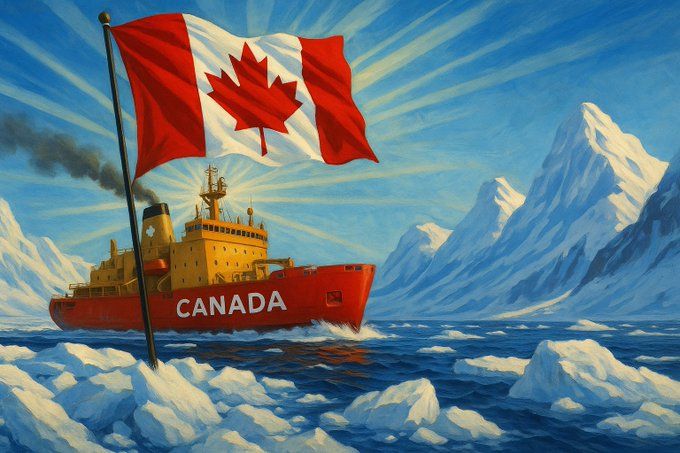
Canada's Arctic policies shouldn't copy Russia's. They should reflect its own geography, economy, and strategic needs.
Different challenges. Different opportunities. Different countries.
/fin
02.08.2025 14:01 — 👍 4 🔁 0 💬 0 📌 0
The crux of this is that when we compare Canada to Russia in the Arctic - militarily, economically, logistically - we need to remember:
They’re not playing the same game.
And they don’t need the Arctic in the same way.
02.08.2025 14:01 — 👍 4 🔁 0 💬 1 📌 0
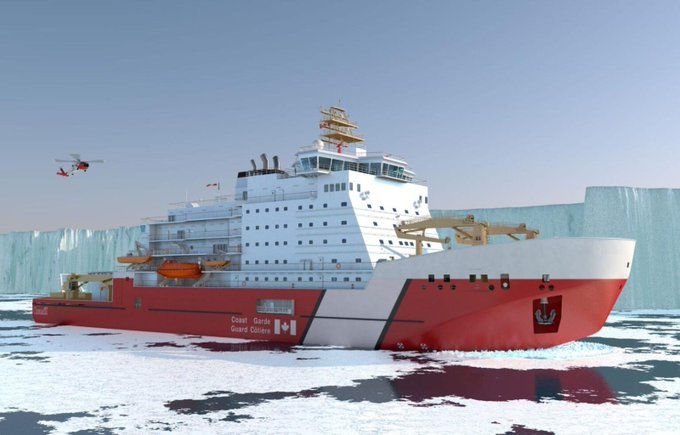
Canada’s in-construction pair of Polar-class icebreakers will exceed the ice-breaking capability of any ship Russia operates—including its nuclear-powered icebreakers.
Why?
Because Canada faces thicker, harder ice, closer to home more often.
That’s Canada’s necessity.
02.08.2025 14:01 — 👍 2 🔁 0 💬 1 📌 0
Similar logic applies to Russia’s greater investment in Arctic military facilities, and industry.
But, again, that reflects necessity - not, necessarily, advantage.
But this doesn’t just cut one way.
02.08.2025 14:01 — 👍 1 🔁 0 💬 1 📌 0
Canada, meanwhile, mostly needs icebreakers in the Arctic when they can plausibly facilitate shipping - when other ships are able to operate there. This means Canada’s icebreakers travel back and forth between the Arctic and ice-free ports and tend to winter farther South.
02.08.2025 14:01 — 👍 1 🔁 0 💬 1 📌 0
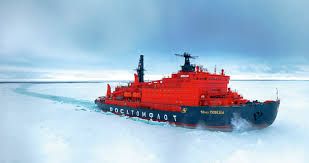
Similarly, Canada is sometimes criticized for not investing in nuclear powered icebreakers as Russia does.
However, Russia’s geography requires its icebreakers to remain in the Arctic year-round, where keeping them fueled is logistically difficult and expensive.
02.08.2025 14:01 — 👍 2 🔁 0 💬 1 📌 0
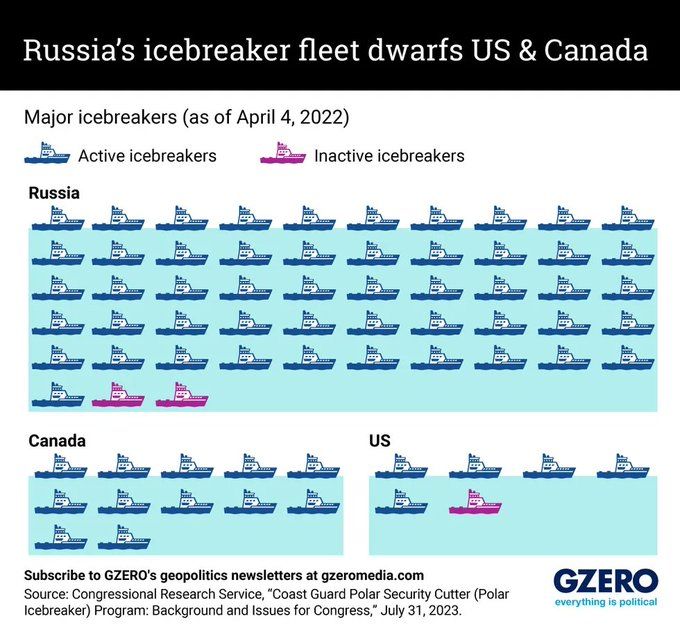
This leads to differences in how the two countries invest in the Arctic.
For example: Canada is often criticized for not “keeping up” with Russia’s icebreaker fleet.
But the incentives justifying Russia’s fleet - both economic and strategic - simply don’t exist for Canada.
02.08.2025 14:01 — 👍 1 🔁 0 💬 1 📌 0
What this difference in other strategic options means is that the two countries don’t need access to the Arctic in the same ways.
For Canada, Arctic access is valuable.
For Russia, Arctic access is existential.
02.08.2025 14:01 — 👍 2 🔁 0 💬 1 📌 0
Meanwhile, Russia’s Eastern ports are thousands of kilometers from where most industry is and, even then, connect to the Sea of Japan - the exits from which are controlled by another potentially unfriendly power.
That leaves only the Arctic as an unthreatened route.
02.08.2025 14:01 — 👍 1 🔁 0 💬 1 📌 0
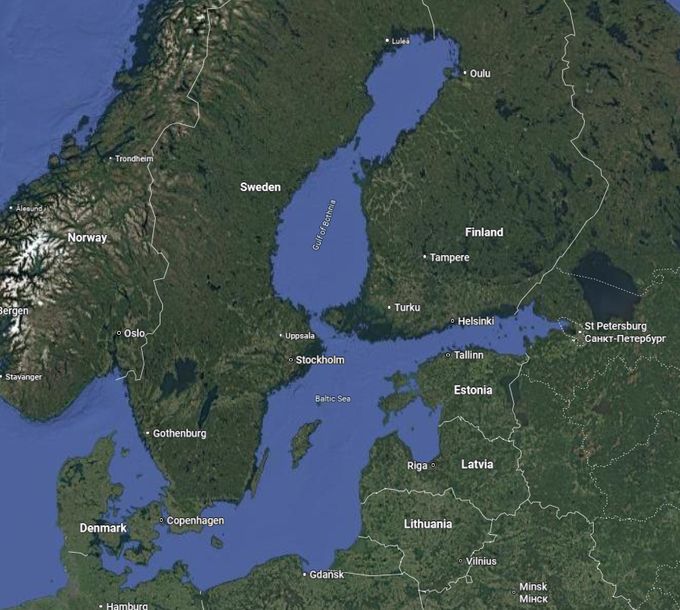
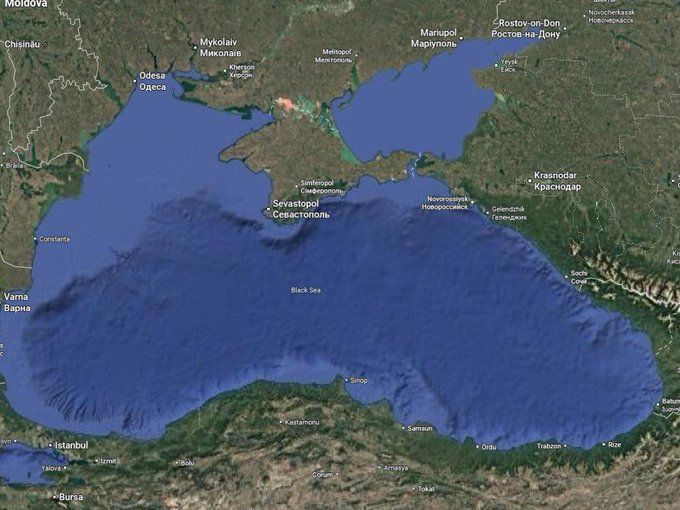
Russia’s situation is very different.
Russia’s best Western ports—St. Petersburg and Novorossiysk—are stuck in inland seas (the Baltic and Black seas, respectively), bottlenecked by potentially unfriendly powers.
02.08.2025 14:01 — 👍 2 🔁 0 💬 1 📌 0
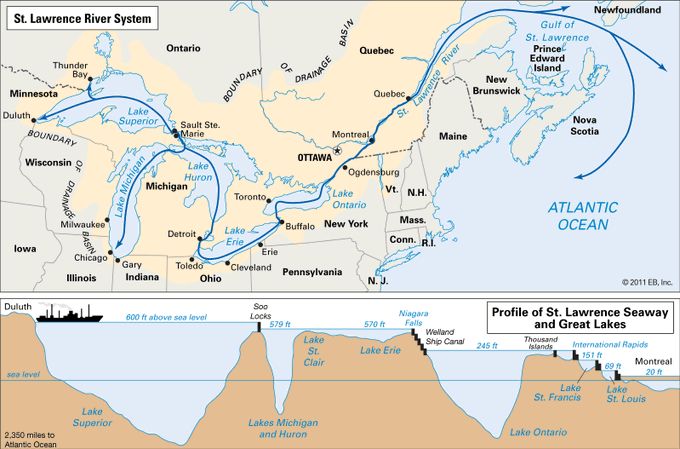
Canada also has the Great Lakes–St. Lawrence Seaway: not ice-free, but is the farthest inland navigable waterway on Earth, and cuts through Canada’s industrial heartland on its way to vast interior resources.
Bottom line: Canada doesn’t need to ship through the Arctic.
02.08.2025 14:01 — 👍 1 🔁 0 💬 1 📌 0
Canada is blessed with some of the best natural, ice-free, harbours in the world on both its East and West coasts. Vancouver, Halifax, Prince Rupert and Saint John are all contenders to be among the 10 best natural harbours anywhere - all opening directly into the High Seas.
02.08.2025 14:01 — 👍 2 🔁 0 💬 1 📌 0
The third difference can be easy to overlook, but is at least as important as the first two:
Strategic alternatives.
Canada has other options. Russia does not.
02.08.2025 14:01 — 👍 1 🔁 0 💬 1 📌 0
What this means is that Russia can move goods from its economic heartland into the Arctic more easily and more cheaply.
And thanks to better shipping conditions, those goods can actually go somewhere - whether to other parts of Russia’s Arctic or to be traded with other nations.
02.08.2025 14:01 — 👍 1 🔁 0 💬 1 📌 0
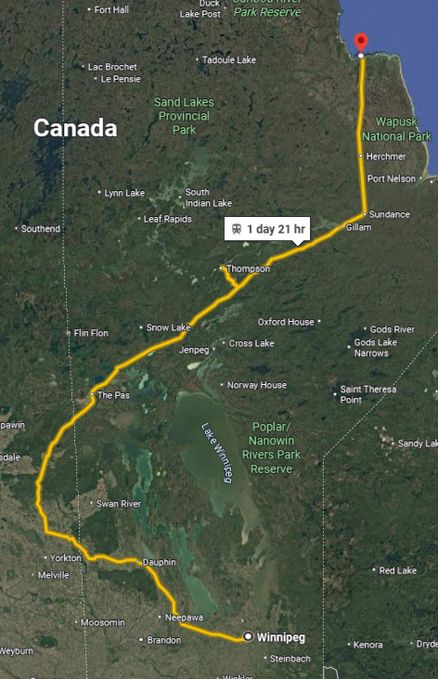
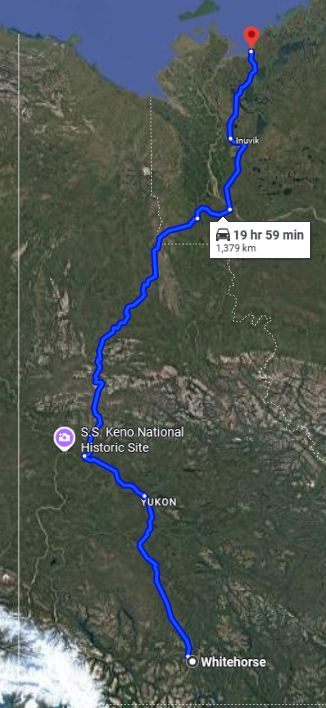
Canada by contrast has one “Arctic” port: Churchill.
But its closest major city, also ~1300km away, is Winnipeg (Pop. ~800k), and Churchill is still 1,000km from the Arctic Circle.
To get truly Arctic you’re looking at Tuktoyaktuk. Closest city of size? Whitehorse (Pop. ~30k).
02.08.2025 14:01 — 👍 1 🔁 0 💬 1 📌 0
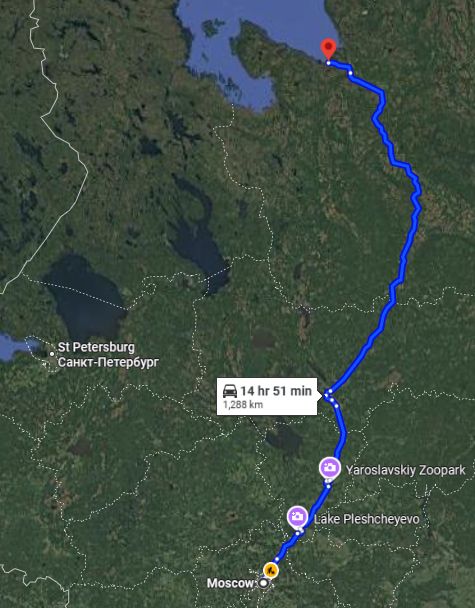
The second key difference is how accessible the Arctic is from each country’s economic centre.
Russia’s main economic centres - Moscow and St. Petersburg, with a combined population of ~18 million - are both under 1,300km from Arctic-facing ports like Severodvinsk.
02.08.2025 14:01 — 👍 1 🔁 0 💬 1 📌 0
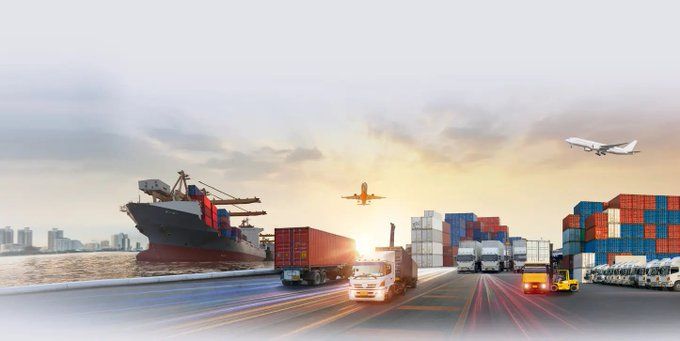
This difference in shipping seasons matters.
Sea shipping is by far the lowest cost way to move goods. It’s hard to be economically competitive without it.
So easier Arctic shipping means more trade, and more trade drives development.
02.08.2025 14:01 — 👍 1 🔁 0 💬 1 📌 0
The result is that Russia has a longer natural Arctic shipping season into, out of, and through its Arctic regions than Canada does. And it’s easier for them to extend this season through the use of icebreakers, making some routes viable year-round.
02.08.2025 14:01 — 👍 1 🔁 0 💬 1 📌 0
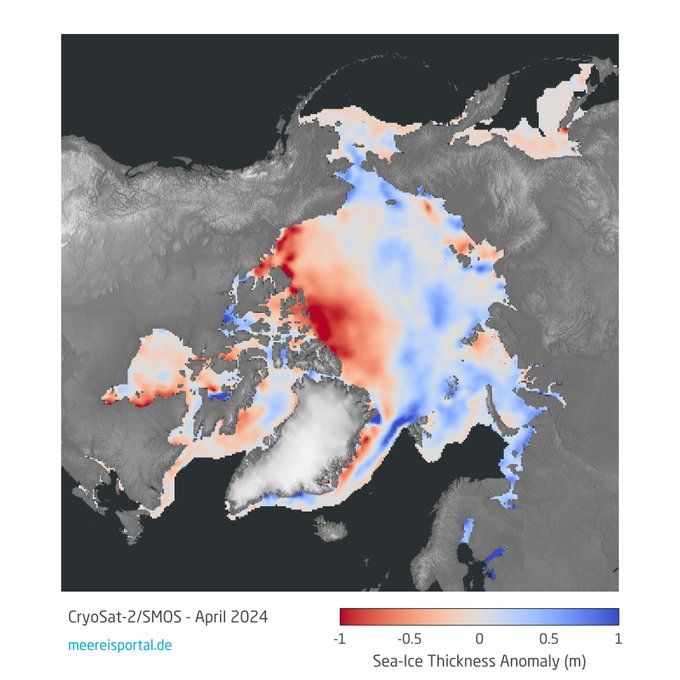
In warm waters, barrier islands are a benefit - creating sheltered routes for ships.
In the Arctic? They trap ice.
Sea ice around Canada piles into massive ridges in winter - impassable to even the heaviest icebreakers - and lingers longer into summer.
02.08.2025 14:01 — 👍 1 🔁 0 💬 1 📌 0
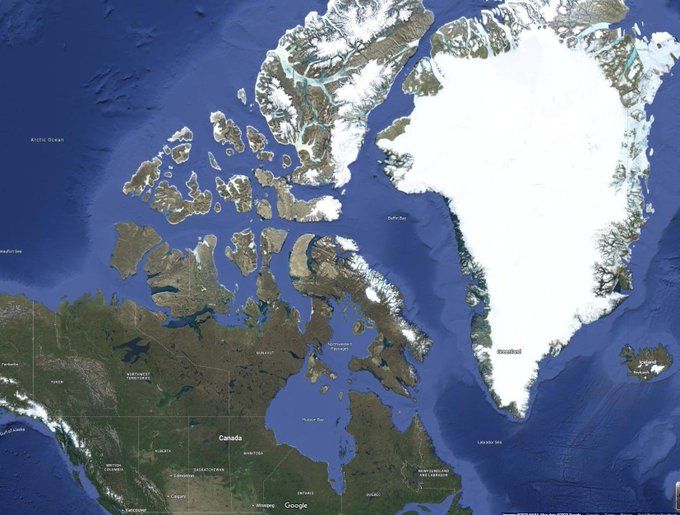
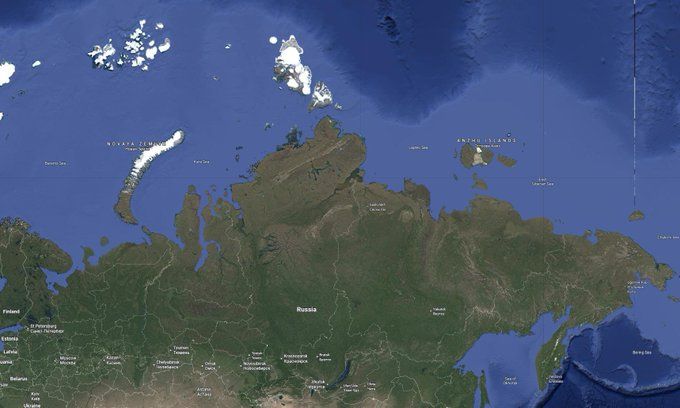
First, the Arctic’s physical geography.
North of Canada’s main landmass is a dense archipelago - nearly 100 large islands (and thousands of small ones) with narrow channels in between.
Russia’s Arctic is mostly a single, contiguous, coastline with a few scattered islands.
02.08.2025 14:01 — 👍 1 🔁 0 💬 1 📌 0
Canada and Russia have fundamentally different relationships with the Arctic.
That’s because of three primary factors:
- Physical geography
- Proximity to economic centres
- Strategic alternatives
02.08.2025 14:01 — 👍 1 🔁 0 💬 1 📌 0
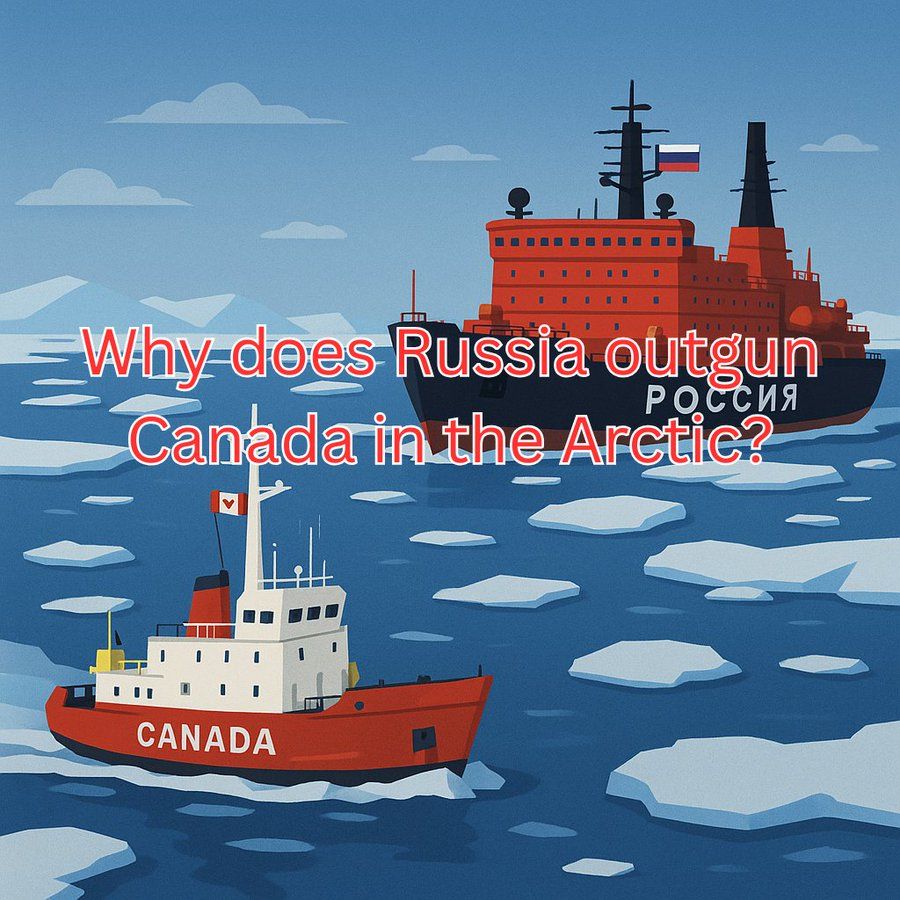
Canada’s renewed focus on Arctic security has led to lots of comparisons with Russia’s Arctic posture - usually to Canada’s disadvantage.
But these comparisons tend to ignore some key realities. I want to break some of that down. 🧵
02.08.2025 14:01 — 👍 10 🔁 1 💬 1 📌 1
What happened on July 4 2024?
22.03.2025 12:21 — 👍 5 🔁 0 💬 1 📌 0
Whatever Carney and his government's precise reasoning, this seems like a clear indication that his term as PM is not going to be a meek one.
He's willing to gamble with high stakes to make an impression before he faces voters.
I hope his bets pay off for Canada.
15.03.2025 02:37 — 👍 4 🔁 0 💬 0 📌 1
Maybe that's an economic advantage. Maybe it's a political one.
As someone who sees value in Canada having a capable military, I hope they're doing this convinced that Trump won't react as forcefully as he could. But either of those advantages might be served better if he does.
15.03.2025 02:37 — 👍 5 🔁 0 💬 1 📌 0
The only reason to publicly state, now, that we may reduce the F-35 order (Blair's comments were clear - it's a reduction that's on the table, not a cancellation) order is because they see some advantage in doing so that the more discrete approach doesn't create.
15.03.2025 02:37 — 👍 1 🔁 0 💬 1 📌 0
The gov't could *easily* say that they see a need to grow the RCAF faster, and will continue with F-35 purchases as well as another fighter.
Then if, at some point down the line, they decide not to order more F-35s (whose purchases are staged), we already possess an alternative.
15.03.2025 02:37 — 👍 1 🔁 0 💬 1 📌 0
Okay, so what's our new government thinking?
Well, I think it's fair to say that there is a national security imperative to become less reliant on the US. That's why it's no surprise they'd consider this.
But that imperative does *not* require them to proceed like this.
15.03.2025 02:37 — 👍 1 🔁 0 💬 1 📌 0
It's also notable that, with the huge exception of Ukraine, all Trump's rhetoric has been about wanting allies to increase their military budgets. We haven't even really heard threats from Trump about blocking military sales.
Whether that's from ignorance or decision... 🤷♂️
15.03.2025 02:37 — 👍 1 🔁 0 💬 1 📌 0
Tyrants are my enemies | Si vis pacem para bellum |🇩🇪🇪🇺| Das Böse triumphiert allein dadurch, dass gute Menschen nichts unternehmen |Military & History
Editor, @pressprogress.ca | Send tips and story ideas: llebrun@pressprogress.ca
Trained journalist, Editor, documentary maker and sports commentator.
Ukraine expert. Numbers nerd.
Almost famous on Xitter!
Coffee donations accepted!
https://ko-fi.com/twmcltd
Waitress turned Congresswoman for the Bronx and Queens. Grassroots elected, small-dollar supported. A better world is possible.
ocasiocortez.com
Engaging stories. Bold voices. Big ideas. Maclean’s leads the national conversation on everything that matters in Canada. macleans.ca
Canada's Conversation. Award-winning independent journalism, fact checking, and national ideas-focused events. Stay connected: http://thewalrus.ca/newsletters
Our pod of investigative journalists dives deep to tell stories about the natural world in Canada you can’t find anywhere else. Sign up for our newsletter: http://thenarwhal.ca/newsletter
Globalnews.ca – Watch and read Canada’s Breaking news plus Business, Health, Politics and World News
[bridged from https://globalnews.ca/ on the web: https://fed.brid.gy/web/globalnews.ca ]
Independent BC-based journalism swimming against the current. Paywall-free since 2003. support.thetyee.ca
Western Canada's largest news team. Send tips to VanTips@postmedia.com. Sign up for our free newsletters here: https://vancouversun.com/newsletters/
News and views from Winnipeg and Manitoba. Replies and mentions here are not monitored. To contact us: Customer Service: wfp.to/service | News tips wfp.to/newstip
Follow for features, news and to-the-minute updates on developing stories ➡️ montrealgazette.com
Témoin privilégié de l’évolution de toutes les femmes 🙋🏻♀️🙋🏽♀️🙋🏾♀️🙋🏿♀️🙋🏼♀️ - Santé. Vie pratique. Cuisine. Féminisme. Lectures.
Proudly Calgary since 1883.
Follow us for the latest local, business, arts and sports news, plus national and world headlines.
Questions, suggestions or tips? Message us here, email submit@calgaryherald.com or call 403-235-7433
Your source for news, culture and more!
📩 news@nowtoronto.com
www.nowtoronto.com
Written by academic experts, edited by journalists, backed by evidence
✉️ Newsletter: http://bit.ly/2W8X3Ev
🎧 Podcast: http://bit.ly/39v1EE0
➕ Donate: http://bit.ly/3GV1uam
L’expertise universitaire, l’exigence journalistique
📰 Consultez notre site web : https://theconversation.com/ca-fr
✉️ Abonnez-vous à notre infolettre : https://bit.ly/3z21HSW
Award-winning Canadian journalism that:
🔎 Holds the rich & powerful accountable
🔎 Exposes unsafe & unfair workplaces
🔎 Shines a light on hate & bigotry
Website: PressProgress.ca
Newsletter: PressProgress.ca/Newsletter
B.C. News. Sports. Entertainment. Send tips to VanTips@postmedia.com. Sign up for our free newsletters here: https://theprovince.com/newsletters/
Toute l'info, 100% gratuite. La plus grande salle de rédaction francophone indépendante en Amérique du Nord.














